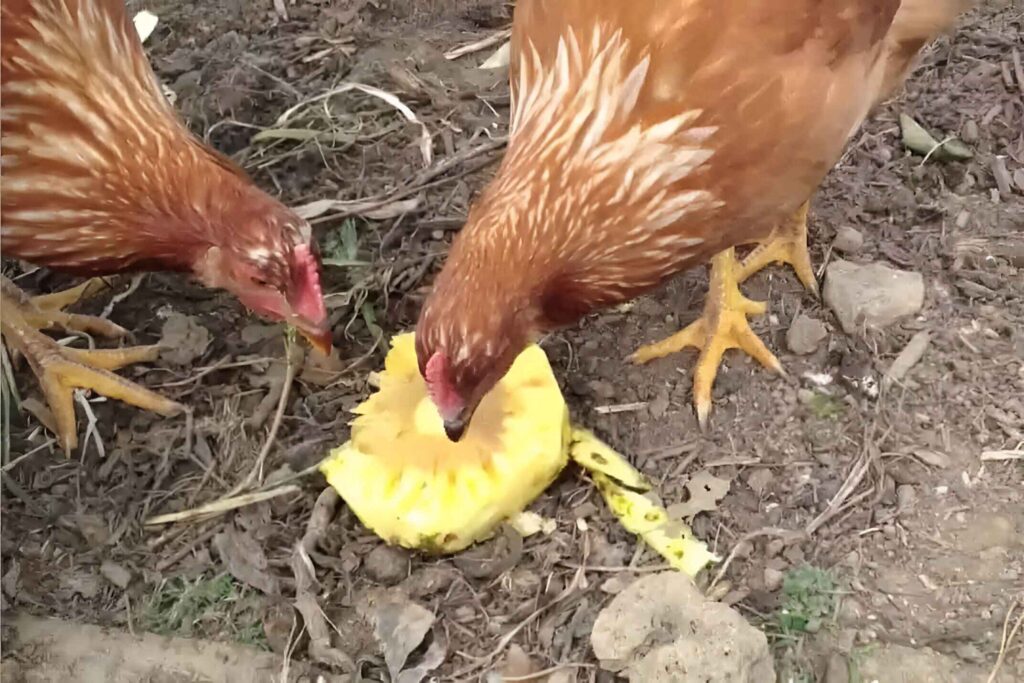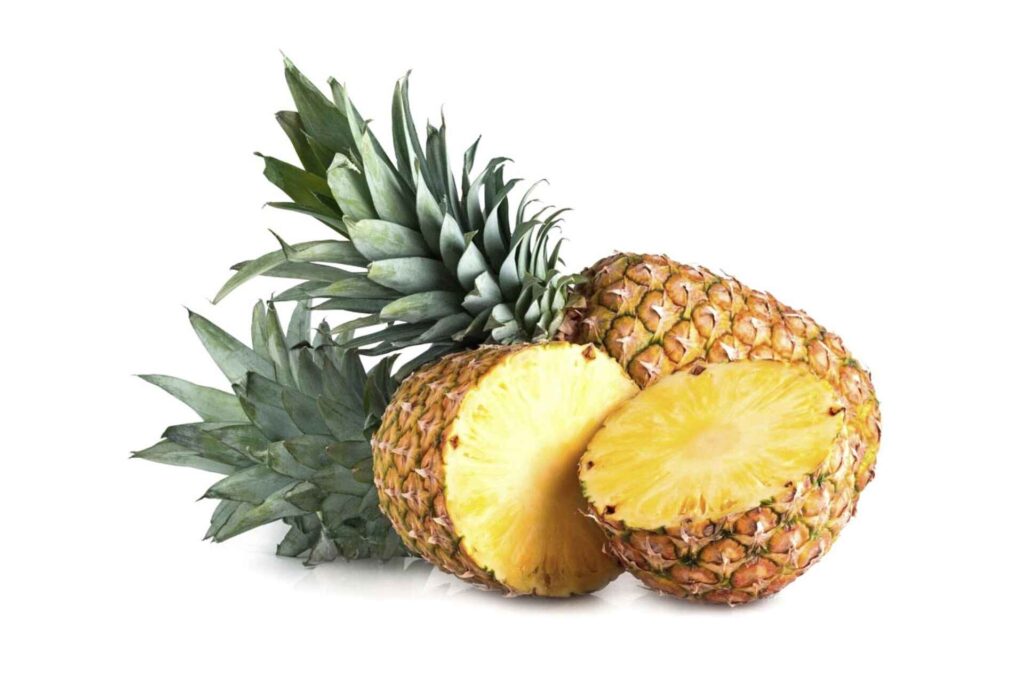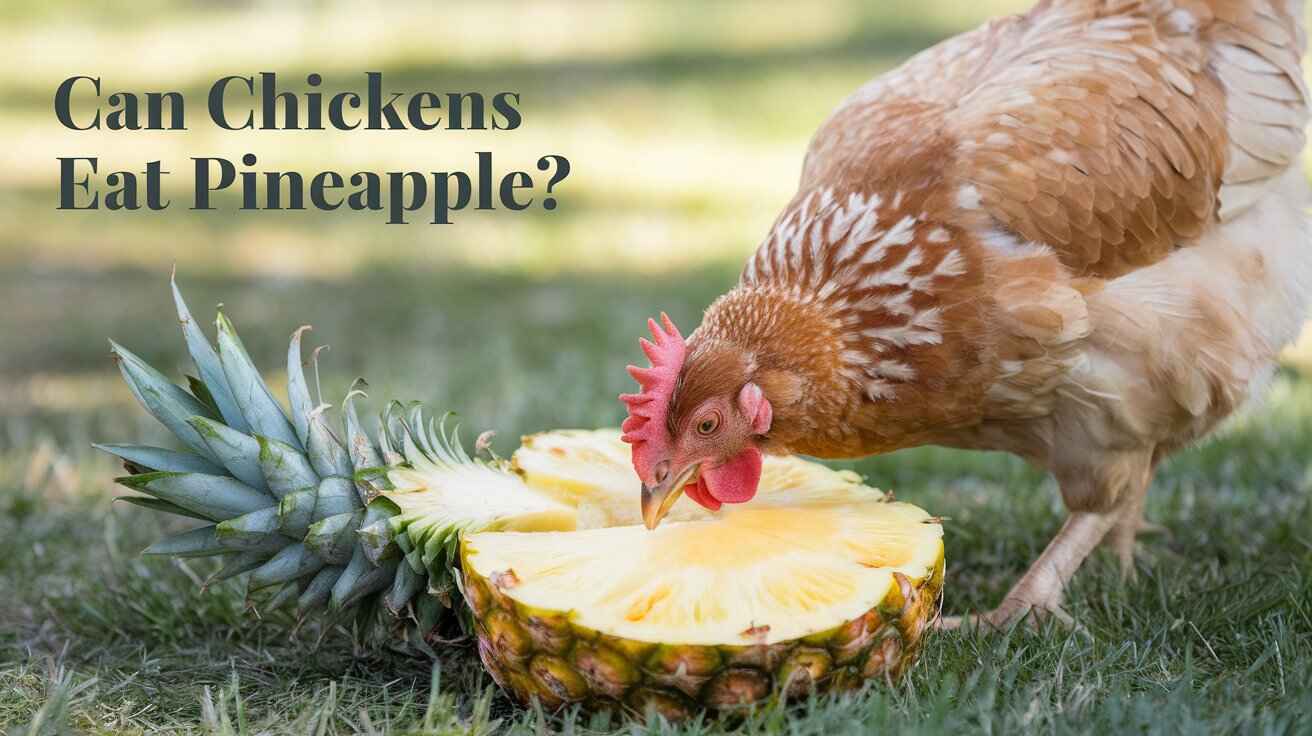Ever wondered if your chickens can eat pineapple? The answer is YES, but it’s not as simple as tossing some raw or frozen chunks into the coop. Pineapple can be nutritional and beneficial, but only when the parts given are safe. While crowns and skin may be toxic, the core and flesh are edible in small serving sizes. Feeding too much or canned pineapple with added sugar can pose risks to your flock’s health.
As a chicken owner, I’ve researched this topic to find the best practices for feeding this tropical fruit. Offering pineapple together with a balanced diet ensures your chickens enjoy the flavor without any compromise to their well-being.
Take the time to tackle this question carefully and check the facts beforehand. Your livestock deserves thoughtful care, and a little preparation will go a long way in keeping your flock happy and healthy!

Table of Contents
ToggleCan Chickens Eat Pineapples?
Yes, chickens can safely enjoy pineapples as a special treat, but moderation is the key to keeping your flock healthy. While fresh pineapple is beneficial and packed with nutrients, make sure the outer layer and spikes are fully removed to avoid any harmful effects.
Avoid frozen or overly sweetened options, as the sugar content can be too high for regular feeding. Many owners find that adding pineapple to their chickens’ diet occasionally is a great way to provide variety while supporting their overall health and enjoying watching them explore new food.
Always prepare it fresh and keep the portion sizes small for safe consumption. If you’re exploring more fruit and vegetable options for your flock, you might also be curious about Can Chickens Eat Potatoes? — another common food with specific feeding guidelines.
How Much Pineapple Can Chickens Eat?
When it comes to pineapple, moderation is the golden rule. Chickens love treats, but their diet should remain balanced to ensure proper egg-laying and overall health. A good rule of thumb is to give no more than 1 Tbsp of pineapple per adult chicken, 1-2 times per week. This allows your flock to enjoy the benefits without overloading on sugar, which can lead to obesity, fatty liver, or other health issues.
To make the treat more enjoyable and safe, cut the pineapple into small, bite-sized pieces and introduce it gradually. This helps you monitor their consumption and ensures they don’t develop a preference for treats over their regular feed.
Pairing pineapple with a variety of other options like grapes, blackberries, or even high-protein snacks like meat or foraged greens keeps your flock happy and thriving. Always dispose of any leftover fruit to prevent it from rotting, as this can create additional risks for your chickens.
Pairing pineapple with a variety of other options like grapes, blackberries, or even high-protein snacks like meat or foraged greens keeps your flock happy and thriving. You can also mix things up by exploring other hydrating treats. Can Chickens Eat Watermelon? is a great example of a refreshing option to include in their treat rotation. Always dispose of any leftover fruit to prevent it from rotting, as this can create additional risks for your chickens.

The Health Benefits of Pineapple for Chickens
Pineapple is not only a tasty treat for your flock, but it’s also packed with nutrients like fiber, vitamins, and essential minerals that promote overall health. It contains bromelain, an enzyme that aids digestion by breaking down protein in the gut, ensuring smoother food absorption and a healthier microbiome.
This benefit is particularly useful during the hot summer days, as pineapple is incredibly hydrating, with a high water content to keep your chickens cool and comfortable.
In addition to aiding digestion, vitamins such as vitamin C and vitamin B6 support the immune system, reduce stress, and boost egg production in laying hens. Essential minerals like calcium and magnesium improve bone health and are crucial for consistent egg-laying.
Plus, the anti-inflammatory and anti-bacterial properties of bromelain help fight harmful bacteria while promoting well-being.
By incorporating pineapple into their diet in moderation, your flock can enjoy these benefits without the risks of overfeeding. With proper balance, pineapple becomes a valuable addition to your poultry’s nutrition, enhancing their overall health and well-being.
How Pineapple Affects Chickens?
Pineapple can have several positive effects on your chickens when fed in moderation. The natural sugars in pineapple provide a quick energy boost, keeping your flock active and healthy. Its vitamins and minerals contribute to healthier, shinier feathers and improved overall quality.
With its high fiber content, pineapple supports smooth digestion, ensuring their systems keep running efficiently. Some owners have even observed better egg production when including pineapple in a balanced diet of fruits. Always monitor how your chickens react and adjust the portions to avoid any adverse outcomes.
Potential Risks of Overfeeding Pineapple
While pineapple is generally safe for chickens, overfeeding can lead to serious issues. Too much sugar and fiber can cause digestive problems like diarrhea or an upset stomach. Additionally, feeding too much pineapple may create a nutritional imbalance, disrupting the well-rounded diet that keeps your birds healthy.
Some chickens may experience allergic reactions, including skin irritation, breathing difficulties, or even severe cases like anaphylaxis. Always watch closely for signs of distress or changes in their behavior, and avoid giving the hard shell, which is inedible and can be harmful.

What is the Best Way to Feed Pineapple to Chickens?
Feeding pineapple to your chickens can be a fun and healthy treat, but proper preparation is key. Always remove the skin and core as they are too tough and can pose a choking hazard. Chop the pineapple into small, manageable pieces or cubes to make it easier for them to eat.
Place the pieces on a plate, dish, or cutting board instead of the floor, which might have dirt, poop, or dust. This keeps the treat clean and safe for your flock.
For extra variety, you can try dried pineapple, but make sure to soak it in water first to add back some moisture. Chickens lack teeth, so smaller, softer chunks prevent them from getting distressed.
Monitor their consumption gradually to avoid any digestive issues, and ensure balance by mixing pineapple with other fruits or vegetables for a more diverse diet. Properly storing the pineapple in a cool, dry place helps maintain its quality until you’re ready to feed it.
Final Say
Pineapple can be a tasty treat and a nutritious option for your chickens, offering essential vitamins, minerals, and fiber. When fed in moderation and with proper care, this tropical fruit can provide great health benefits for your flock, such as helping to protect against conditions like arthritis and improving overall dietary balance. However, avoid overindulgence, as too much can compromise their health.
Always monitor their consumption, use small pieces, and consider dried pineapple as an option to reduce waste if you’re concerned about it expiring. By following best practices, you ensure your birds enjoy the benefits of pineapple without unnecessary risks.




